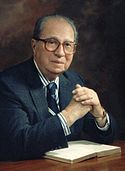Mortimer J. Adler Quote
76. David Hume – Treatise on Human Nature; Essays Moral and Political; An Enquiry Concerning Human Understanding77. Jean-Jacques Rousseau – On the Origin of Inequality; On the Political Economy; Emile – or, On Education, The Social Contract78. Laurence Sterne – Tristram Shandy; A Sentimental Journey through France and Italy79. Adam Smith – The Theory of Moral Sentiments; The Wealth of Nations80. Immanuel Kant – Critique of Pure Reason; Fundamental Principles of the Metaphysics of Morals; Critique of Practical Reason; The Science of Right; Critique of Judgment; Perpetual Peace81. Edward Gibbon – The Decline and Fall of the Roman Empire; Autobiography82. James Boswell – Journal; Life of Samuel Johnson, Ll.D.83. Antoine Laurent Lavoisier – Traité Élémentaire de Chimie (Elements of Chemistry)84. Alexander Hamilton, John Jay, and James Madison – Federalist Papers85. Jeremy Bentham – Introduction to the Principles of Morals and Legislation; Theory of Fictions86. Johann Wolfgang von Goethe – Faust; Poetry and Truth87. Jean Baptiste Joseph Fourier – Analytical Theory of Heat88. Georg Wilhelm Friedrich Hegel – Phenomenology of Spirit; Philosophy of Right; Lectures on the Philosophy of History89. William Wordsworth – Poems90. Samuel Taylor Coleridge – Poems; Biographia Literaria91. Jane Austen – Pride and Prejudice; Emma92. Carl von Clausewitz – On War93. Stendhal – The Red and the Black; The Charterhouse of Parma; On Love94. Lord Byron – Don Juan95. Arthur Schopenhauer – Studies in Pessimism96. Michael Faraday – Chemical History of a Candle; Experimental Researches in Electricity97. Charles Lyell – Principles of Geology98. Auguste Comte – The Positive Philosophy99. Honoré de Balzac – Père Goriot; Eugenie Grandet100. Ralph Waldo Emerson – Representative Men; Essays; Journal101. Nathaniel Hawthorne – The Scarlet Letter102. Alexis de Tocqueville – Democracy in America103. John Stuart Mill – A System of Logic; On Liberty; Representative Government; Utilitarianism; The Subjection of Women; Autobiography104. Charles Darwin – The Origin of Species; The Descent of Man; Autobiography105. Charles Dickens – Pickwick Papers; David Copperfield; Hard Times106. Claude Bernard – Introduction to the Study of Experimental Medicine107. Henry David Thoreau – Civil Disobedience; Walden108. Karl Marx – Capital; Communist Manifesto109. George Eliot – Adam Bede; Middlemarch110. Herman Melville – Moby-Dick; Billy Budd111. Fyodor Dostoevsky – Crime and Punishment; The Idiot; The Brothers Karamazov112. Gustave Flaubert – Madame Bovary; Three Stories113. Henrik Ibsen – Plays114. Leo Tolstoy – War and Peace; Anna Karenina; What is Art?; Twenty-Three Tales115. Mark Twain – The Adventures of Huckleberry Finn; The Mysterious Stranger116. William James – The Principles of Psychology; The Varieties of Religious Experience; Pragmatism; Essays in Radical Empiricism117. Henry James – The American; The Ambassadors118. Friedrich Wilhelm Nietzsche – Thus Spoke Zarathustra; Beyond Good and Evil; The Genealogy of Morals;The Will to Power119. Jules Henri Poincaré – Science and Hypothesis; Science and Method120. Sigmund Freud – The Interpretation of Dreams; Introductory Lectures on Psychoanalysis; Civilization and Its Discontents; New Introductory Lectures on Psychoanalysis121. George Bernard Shaw – Plays and Prefaces
76. David Hume – Treatise on Human Nature; Essays Moral and Political; An Enquiry Concerning Human Understanding77. Jean-Jacques Rousseau – On the Origin of Inequality; On the Political Economy; Emile – or, On Education, The Social Contract78. Laurence Sterne – Tristram Shandy; A Sentimental Journey through France and Italy79. Adam Smith – The Theory of Moral Sentiments; The Wealth of Nations80. Immanuel Kant – Critique of Pure Reason; Fundamental Principles of the Metaphysics of Morals; Critique of Practical Reason; The Science of Right; Critique of Judgment; Perpetual Peace81. Edward Gibbon – The Decline and Fall of the Roman Empire; Autobiography82. James Boswell – Journal; Life of Samuel Johnson, Ll.D.83. Antoine Laurent Lavoisier – Traité Élémentaire de Chimie (Elements of Chemistry)84. Alexander Hamilton, John Jay, and James Madison – Federalist Papers85. Jeremy Bentham – Introduction to the Principles of Morals and Legislation; Theory of Fictions86. Johann Wolfgang von Goethe – Faust; Poetry and Truth87. Jean Baptiste Joseph Fourier – Analytical Theory of Heat88. Georg Wilhelm Friedrich Hegel – Phenomenology of Spirit; Philosophy of Right; Lectures on the Philosophy of History89. William Wordsworth – Poems90. Samuel Taylor Coleridge – Poems; Biographia Literaria91. Jane Austen – Pride and Prejudice; Emma92. Carl von Clausewitz – On War93. Stendhal – The Red and the Black; The Charterhouse of Parma; On Love94. Lord Byron – Don Juan95. Arthur Schopenhauer – Studies in Pessimism96. Michael Faraday – Chemical History of a Candle; Experimental Researches in Electricity97. Charles Lyell – Principles of Geology98. Auguste Comte – The Positive Philosophy99. Honoré de Balzac – Père Goriot; Eugenie Grandet100. Ralph Waldo Emerson – Representative Men; Essays; Journal101. Nathaniel Hawthorne – The Scarlet Letter102. Alexis de Tocqueville – Democracy in America103. John Stuart Mill – A System of Logic; On Liberty; Representative Government; Utilitarianism; The Subjection of Women; Autobiography104. Charles Darwin – The Origin of Species; The Descent of Man; Autobiography105. Charles Dickens – Pickwick Papers; David Copperfield; Hard Times106. Claude Bernard – Introduction to the Study of Experimental Medicine107. Henry David Thoreau – Civil Disobedience; Walden108. Karl Marx – Capital; Communist Manifesto109. George Eliot – Adam Bede; Middlemarch110. Herman Melville – Moby-Dick; Billy Budd111. Fyodor Dostoevsky – Crime and Punishment; The Idiot; The Brothers Karamazov112. Gustave Flaubert – Madame Bovary; Three Stories113. Henrik Ibsen – Plays114. Leo Tolstoy – War and Peace; Anna Karenina; What is Art?; Twenty-Three Tales115. Mark Twain – The Adventures of Huckleberry Finn; The Mysterious Stranger116. William James – The Principles of Psychology; The Varieties of Religious Experience; Pragmatism; Essays in Radical Empiricism117. Henry James – The American; The Ambassadors118. Friedrich Wilhelm Nietzsche – Thus Spoke Zarathustra; Beyond Good and Evil; The Genealogy of Morals;The Will to Power119. Jules Henri Poincaré – Science and Hypothesis; Science and Method120. Sigmund Freud – The Interpretation of Dreams; Introductory Lectures on Psychoanalysis; Civilization and Its Discontents; New Introductory Lectures on Psychoanalysis121. George Bernard Shaw – Plays and Prefaces
Related Quotes
About Mortimer J. Adler
He lived for long stretches in New York City, Chicago, San Francisco, and San Mateo, California.
